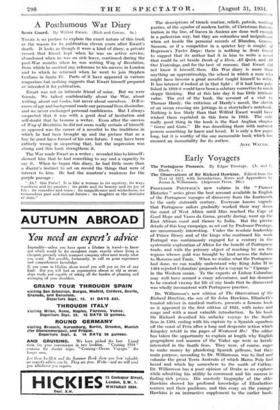A Posthumous War Diary
Scots Guard. By Wilfrid Ewart. (Rich and Cowan. 9s.) THERE is no preface to explain the exact nature of this book or the reason for its publication eleven years after Ewart's death. It looks as though it were a kind of diary, a private record that Ewart kept when he was on active service, abandoned when he was on sick-leave, continued during the post-War months when he was writing Way of Revelation, from which he omitted any reference to his success in London and to which he returned when he Went to join Stephen Graham in Santa Fe. Parts of it have appeared in various magazines but nothing suggests that Ewart himself prepared or intended it for publication.
Ewart was not an intimate friend of mine. But we were friends. We talked confidentially about the War, about writing, about our books, but never about ourselves. Differ- ences of age and background made our personal lives dissimilar, and we never exchanged personal confidences. But I always suspected that it was with a good deal of hesitation and self-doubt that he became a writer. Even after the success of Way of Revelation he did not seem really certain of himself, so opposed was the career of a novelist to the traditions in which he had been brought up and the picture that as a boy he must have formed of his own future. I may have been entirely wrong in suspecting that, but the impression was strong and this book strengthens it.
The War made Ewart as a writer ; revealed him to himself ; showed him that he had something to say and a capacity to say it. When he began this diary, he had little more than a diarist's instinct to set on record the things that were of interest to him. He had the amateur's weakness for the purple passage :
" Ah I this Paris ! It is like a woman in its mystery, its way- wardness and its passion ; its pride and its beauty and its joy of life : its comedies and tears : its magnificence and wickedness, its tremendous past and eternal future : its laughter at the destinies of man." The descriptions Of 'trench routine, reliefs, patrols, working parties, of the squalor of modern battle, of Christmas fratern- ization in the line, of leaves in Amiens are done well enough in a pedestrian way, but they are colourless and insignificant when set beside the personal records of Blunden, Graves, Sassoon, or if a competitor in a quieter key, is sought, of Rogerson's Twelve Days; there is nothing in Scots Guard to suggest that its author had it in him to write a novel that could be set beside Death of a Hero, All Quiet, and Alt Our Yesterdays, and for the best of reasons, that Ewart (lid not know it himself, then. His War diary is more than anything an apprenticeship, the school in which a man who might have become a great novelist taught himself to write, It has interest if looked at in that light : if it had been pub- lished in 1919 it would have been a salutary corrective to much sloppy thinking. But at this late day it has little intrinsic value. The end of the book, the account of a visit to Thomas Hardy, the criticism of Hardy's novel, the sketch of an ocean crossing are jottings in a storyteller's notebook. Nothing is less likely than that Wilfrid- Ewart would have wished them reprinted in this form in 1934. The only really good thing in the book is the East Anglian chapter Geese and Guns." He was describing there with matured powers something he knew and loved. It is only a few pages long, but it is worthy of the one memorable book which has ensured an immortality for its author.
ALEC WAUGH.






































 Previous page
Previous page